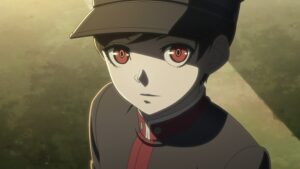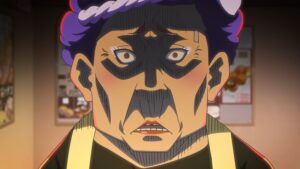It’s difficult to follow an all-star episode like “Brothers,” as this doubleheader can attest. My disappointment with “The City of Lost Children” was so great, in fact, that it delayed this post by a week. After the spectacle and weight of episode 6, we got a decidedly less impressive-looking showing that nevertheless boasted a cool setting in Expo Park – which was absent for 33% of the time, due to a lengthy flashback. Even the central object in the underground park, a rocket that Brother wanted to ride to the moon, was just an excuse to get that flashback off the ground. Its eventual launch was an anticlimax that spilled into episode 8’s beginning, making me fearful for the show’s chances this week, but thankfully it was more my speed. More than appealing to my personal sensibilities, though, it was specifically interested in Swindler, who seems a hundred times more authentic now than she ever has before. All it took to give her some nuance was to pair her with a cute kid instead of a sociopathic gang. Who knew that writing was so easy?
One of my issues with “Lost Children” was that Expo Park itself, despite being long promised as the Akudama’s destination, didn’t have a larger role to play in the events that took place there. Seeing past Earth technology frozen in time at an underground fair was novel, but only the rocket had any bearing on the plot, and not even that was thematically appropriate. Brother and Sister wanted to go to the moon to escape their suffering on Earth, which makes sense only when you view individual decisions on a planetary scale. Couldn’t they settle for life in the wastelands between Kansai and Kanto, a similarly barren environment where no one would dare to pursue them? Also, if Brother was so set on the moon as his ultimate destination, why did he stop at the entrance to the rocket and usher Swindler and his sister inside, then turn to watch the door close dramatically in his face? Both the idea of the moon as a refuge and the reveal of its destroyed state felt incidental to everything else that we learned here.
“Everything else” refers mostly to Brother and Sister’s origin story and the identity of the traitor: Doctor. She did it to get her name off the Akudama list, which makes a lot of sense, especially in the wake of what we learned in episode 8; if you’re on that list, using your ID for any purpose will sound a city-wide alarm. Doctor has bigger ambitions than just buying takoyaki from a street vendor, though. Even though she turned Brother over to the Execution Department to gain her freedom, she was on the hunt for him again the following week, hungry for more data regarding his immortality. That immunity to death was the focus of episode 7’s flashback, where Brother repeatedly woke up in pools of his own blood to start the day. All the dissection and torture that confirmed his immortality was what the flashback hammered home, even though it should have been the friendships he formed with his clone siblings in that testing facility. There’s a lot of talk about the “burden of 5,555 lives” that he and his sister bear, but that bond hardly factored into episode 7’s version of their history, which was a disappointment.
If Brother was the central character of “Lost Children,” Swindler was the superstar of “Black Rain,” a solid installment that pushed her past the point of no return. After fleeing Kansai in the aftermath of that Akudama all-points bulletin I mentioned earlier, she and Sister ended up at a garbage treatment plant on the edge of town. It provided for their needs at first, with canned food and shelter from the rain, but morphed into a den of nightmares when three human-trafficking rapists intrude on their newfound peace. These dudes were straight out of an 80s OVA, utterly lacking in subtlety, and their deaths at Swindler’s hands were similarly blunt. (How could they have failed to spot the knife she held behind her back, especially after she’d already killed the first guy? Why would one of them kneel at her request, even if there was a seemingly logical reason for it?)
Nevertheless, I enjoyed these scenes, both domestic and violent, because they operated from a place of humanity. Swindler’s care for her young companion was motherly in nature, a feeling that was underscored by their resemblance to one another (which might be more than just coincidence). And the brutality of her self-defense stemmed from more than one place, I’m sure. Consider her frustration at returning home, only to find it a hostile environment. The fear of her freedom and bodily agency being stripped away, and the desire to protect Sister from a similarly awful fate. The time she spent traveling with a murderous band of loonies. All of these feelings and experiences lined up perfectly with the moment that she took another person’s life, and it felt good to watch. Yes, the violence was cathartic, but more important is that Swindler stands apart from the violent world around her, even after bloodying her hands. She’s still got her earnest demeanor, and her resolve to reunite Sister with her brother hasn’t wavered. In other words, she’s still herself.
After two months of feeling uninvested in Swindler, I’m finally interested to see what path she’ll take going forward. Will her moral center shift as a result of this life-defining event? Is she some kind of sleeper agent for the Execution Department, as some viewers have suggested? How much will her hair grow in the wake of her big character development moment? This show is too nuts to make any definite predictions, but no matter what goes down in December, episode 8 will stand as a redemptive moment for both Akudama Drive and its central character.





I was hoping that you’d make some more allusions to the films mentioned in the episode titles and how they relate to the episodes. That would give you an excuse to research Jean-Pierre Jeunet and a late 80s Ridley Scott film starring Michael Douglas about the Yakuza. Oh and the next episode’s name is some Stephen King adaptation by some director named Kubrick.
I’m a total casual when it comes to film (I haven’t even seen Jeunet’s Amelie), so making those kinds of parallels is largely outside my reach. The main reason I did it for episode 6 was to give the post some structure beyond “that sure was some good animation.”
I saw The Shining listed as the next title in the PV. Not sure how a show as bombastic as this one will manage that level of unsettling horror – the connection will be more superficial, I expect.
I really liked 8, because it felt like Akudama was finally ready to try and be something more. Sure, before it was wacky action and 6 really delivered on the heart pumping chaos I love. But 8, as you said, is where Swindler really became a character.
Part of what makes it work I think is that episode 8 is the first real break we as an audience have had, and its the same for Swindler, We and her have been on this wild heist since episode 1 and it wasn’t until now that she could finally sit back and realize that everything has changed. Her life has changed.
Basically, episodes 6 and 8 has moved Akudama up from simple fun to one of my favorites of the season
How much will her hair grow in the wake of her big character development moment?
asking the real questions
Can’t agree more about episode 7 and the moon escape subplot. Even for this show it was a bit random. Personally I’m gonna just put that part of the show out of mind to enjoy the rest because the show is still delivering overall.
And will we ever see Kanto. I just wonder why Kansai, that has the technology to make immortals is subservient to Kanto.
I think the Jeunet film was a worthwhile title for its corresponding episode, because if I recall correctly, that movie had Jean-Louis-Tringnent playing an old man trying to stay alive by using kids somehow, that and delicatessen stood out for me most in his filmography for their maximalist weirdness.
Wooper, that you mention those 80s ovas, the big reason I enjoy this show so much is because in the 90s I grew up watching those and I love how this is basically a more “higherbrow” version of that.
I was happy with episode 7 as far as the reveal around the kids because it allowed the show to fill us in a bit more.
I thought episode 8 gave the show a more human core.